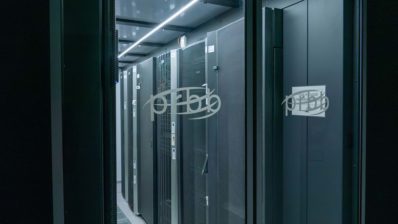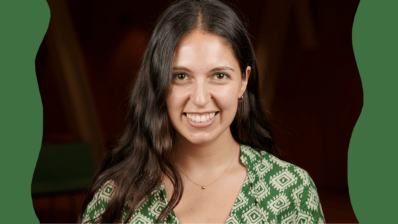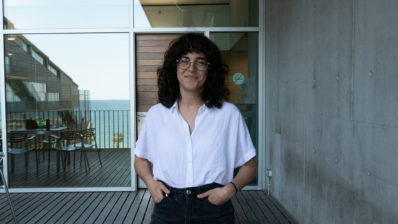The Women in Data Science (WIDS) in Biomedicine -Barcelona conference will take place on September 28th at the auditorium of the Barcelona Biomedical Research Park (PRBB). This conference is a regional event, part of a series of conferences that were born at Stanford University, USA, in 2015, with the aim of “inspiring and educating people of any gender in data science worldwide, and especially supporting women in the field”. To date, nearly 200 WIDS conferences have been organized, at Stanford and at regional events in more than 50 countries. The event at PRBB will be in person at the PRBB Auditorium and will also be streamed online (you can register here). Antonio Plasencia, Director of the Barcelona Institute for Global Health (ISGlobal) and Mercè Crosas, Secretary of Open Government at the Generalitat (Catalan governement) , will open the event.
We spoke with Paula Petrone, ISGlobal researcher and organizer of the conference who, in addition, during this year’s #openPRBB (Saturday, October 8), will host the talk «¿Qué tan inteligente es la inteligencia artificial?» (How smart is artificial intelligence?).
What is the event about?
This open and free event is part of a series of conferences that take place around the world and are part of the Stanford Women in Data Science (WIDS) community that aims to encourage women’s participation in STEM careers and leadership.
This particular event is organized in conjunction with Silvina Catuara Solarz and Andrea Barbiero, as WIDS ambassadors in Barcelona and experts in the areas of neuroscience and digital health and innovation, respectively, which are what we will mainly focus on. We will have female referents in data science in biomedicine, clinical, neurosciences and mental health, diagnostics and digital therapeutics from academia, government, business and startups. The event will be both scientific (with talks in English) and aimed to a wider audience, with a round table in Spanish on “Citizen participation, ethics and gender”.
There will also be space for debate, networking and professional recruitment, as well as a scientific poster session dedicated to students and researchers. We invite all those interested to present their posters and register for the event!
Can you explain what is meant by data science?
Data science refers to the development of algorithms and advanced analytical techniques to extract relevant information from data and obtain predictions and new insights from the patterns in these data, something that would not be feasible without the use of computers. One area of study in data science is artificial intelligence, now booming, including machine learning techniques, for example, and in particular the deep learning techniques that have become so popular in the last decade thanks to the increase in computing hardware power. The application of these new techniques is being widely exploited in the biomedical area, where important contributions are expected in the coming years.
Why are events specific to women in data science important?
Currently two issues add up to a widening gender gap in the field of data science and STEM (science, technology, engineering and mathematics) areas in general.
- One is the lack of female enrolment in STEM careers. According to UNESCO, only 35% of those enrolled in STEM careers are women. This is due to a combination of social factors, both educational and lack of references, or cultural and social tastes or prejudices.
- The other problem is unequal opportunities and the «glass ceiling», which are the set of unwritten rules in organizations that make it difficult for women to rise to leading positions. A study by the consulting firm BCG shows that only 15-22% of data scientists are women, and only 18% of those women are in management positions.
These two problems feed back on each other, as the lack of role models in leadership positions, in turn, does not encourage more women to start these careers.
With this series of annual events WIDS Biomedicine Barcelona, we want to give visibility to women leaders in data science applied to the improvement of health and their magnificent work in academia, entrepreneurship and private sector. However, it is important to emphasize that we are targeting a diverse audience – anyone can come to the event – as change will only happen if not only women participate.
“Change will only happen if both women and men participate in it”
Why is it important to have more women in these fields?
Diversity in science is essential, and in data science even more so, if anything. Far from being humanly intelligent, artificial intelligence today is largely governed by our biases, priorities and values, which drive decision-making about what data to use, algorithms and model assumptions, as well as our subjectivities that inevitably seep into the analysis of results. In the biomedical field as well as in the legal, talent, and other fields, these biases promote social inequality. Gender and cultural diversity in scientific and technical teams is important so that they do not have a negative impact on society.
“Gender and cultural diversity in scientific and technical teams is important, so that they do not have a negative impact on society. In particular in artificial intelligence, largely governed by the biases of those working on it”
Data science happens in all fields… what is special about biomedicine?
There are other WIDS events in Barcelona but this is the only one that focuses on Biomedicine, Digital Health and Life Sciences. Data science and artificial intelligence have the potential to make a huge impact on healthcare that we will see in the coming years. Currently, developments remain mostly in academia. At this event, we expect participants from all sectors: academia, healthcare, private and government. We believe that interaction and communication between professionals from these sectors is crucial for the translation of these new technologies to the clinic with direct impact on patients and society.
“Interaction between professionals from the academic, healthcare, private and government sectors is crucial for new technologies to have a direct impact on patients and society”
Finally, why did you choose to do it at PRBB?
The Equality, Diversity and Inclusion Committee of the Barcelona Biomedical Research Park (PRBB) has welcomed our proposal with great interest and together with ISGlobal, the institution to which I belong, has provided us with the necessary support to make this open and free event a success. Given the size of this event and the number of attendees we expect, they have provided us with the technical facilities so that attendees from other parts of the world can connect virtually. Notably, the PRBB is one of the largest biomedical science hubs in Southern Europe, with more than 1400 people, making it most appropriate to hold this conference here. In addition, it has excellent facilities, with an emphasis on diversity (e.g. inclusive toilets, ramps and access) – in fact, the PRBB has already hosted a meeting of Rladies, a community that also supports women, in this case working with R. Finally, yet importantly, the open-air, waterfront location is unbeatable for networking spaces!







